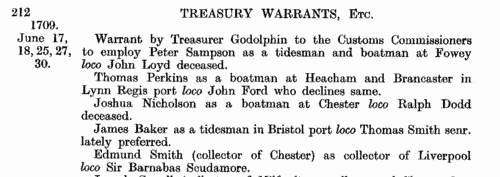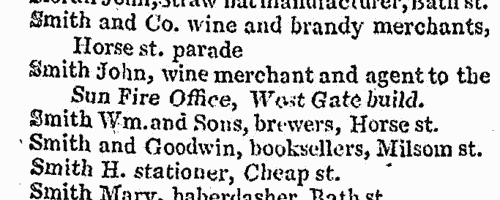Blaikie Surname Ancestry ResultsOur indexes 1000-1999 include entries for the spelling 'blaikie'. In the period you have requested, we have the following 90 records (displaying 1 to 10): Single Surname Subscription | | | Buying all 90 results of this search individually would cost £452.00. But you can have free access to all 90 records for a year, to view, to save and print, for £100. Save £352.00. More... |
These sample scans are from the original record. You will get scans of the full pages or articles where the surname you searched for has been found. Your web browser may prevent the sample windows from opening; in this case please change your browser settings to allow pop-up windows from this site. Scottish litigants, rebels and cautioners
(1578-1585)
The Privy Council of Scotland exercised a superior judicial authority in the kingdom, and consequently received and dealt with a constant stream of petitions, as well as dealing with the internal security of the state. This register of the council from 17 June 1578 to 31 July 1585, in the reign of king James VI, was edited by David Masson, and published under the direction of the Lord Clerk Register of Scotland in 1880. Some of the individuals mentioned are the complainants, those of whom they complained, and the sureties on both sides: at this period, some of the complainants are alleging serious attacks, often of a feuding nature. Many of the bonds entered into by the cautioners are promises to keep the peace towards such enemies. Failure to answer to the council when summoned was a serious contempt, leading to being denounced a rebel, with serious consequences. But 'horning' was also used in the pursuit of debts: there was no imprisonment for debt in Scotland, but a creditor could have an obstinate debtor ordered, in the sovereign's name, to pay what was due, failing which, the debtor could be put to the horn, denounced as a rebel, and imprisoned as a rebel. The main text (to page 762) is from the Acta Secreti Concilii, containing the minutes of the Privy Council, and of occasional Conventions of the Estates. After that are printed some miscellaneous Privy Council documents from the same years. The sources most productive of names, the Acta Cautionis and Registration of Bands, are also the most repetitive in form, and are not transcribed verbatim and literatim: nevertheless, one of the editor's rules was for 'All proper names and names of places occurring in the originals to be preserved in the abstracts without exception, and in the exact original spelling.'
BLAIKIE. Cost: £4.00.  | Sample scan, click to enlarge

| Scottish litigants, rebels and cautioners
(1610-1613)
The Privy Council of Scotland exercised a superior judicial authority in the kingdom, and consequently received and dealt with a constant stream of petitions, as well as dealing with the internal security of the state. This register of the council from July 1610 to February 1613, in the reign of king James VI, was edited by David Masson and published under the direction of the Deputy Clerk Register of Scotland in 1889. The publication starts with the Acta and Decreta, a chronological consolidation of material from Acta Secreti Concilii proper, the Decreta, the Book of Commissions, the Book of Sederunts, the Minute Book of Processes, and The Book of the Isles. There is then a section of Royal and Other Letters (pp. 565-644); then acts and bands (bonds) of caution (surety) from the registers called Acta Cautionis (pp. 647-690); and Miscellaneous Privy Council Papers (693-746). Many of the individuals mentioned are the complainants, those of whom they complained, and the sureties on both sides: at this period, many of the complainants are alleging serious attacks, often of a feuding nature. Many of the bonds entered into by the cautioners are promises to keep the peace towards such enemies. Failure to answer to the council when summoned was a serious contempt, leading to being denounced a rebel, with serious consequences.
BLAIKIE. Cost: £4.00.  | Sample scan, click to enlarge

| Treasury Books
(1709)
Records of the Treasury administration in Britain, America and the colonies, for January to December 1709. These abstracts of the Treasury minute books and corresponding warrants for this period covers a huge variety of topics involving all manner of receipts and expenditure, customs and revenue officials, civil servants, pensioners, petitioners and postmasters figuring particularly among the individuals named.
BLAIKIE. Cost: £4.00.  | Sample scan, click to enlarge

|  Masters of Apprentices registered in Scotland
(1723-1726) Masters of Apprentices registered in Scotland
(1723-1726)
Apprenticeship indentures and clerks' articles were subject to a 6d or 12d per pound stamp duty: the registers of the payments usually give the master's trade, address, and occupation, and the apprentice's father's name and address, as well as details of the date and length of the apprenticeship. There are central registers for collections of the stamp duty in London, as well as returns from collectors in the provinces. There was a single collection for the whole of Scotland, made in Edinburgh. The sums collected are recorded in Scottish money, with conversion to sterling for transfer to London. A Scottish pund was worth 20 English pence. Because of the delay before some collectors made their returns, this register includes indentures and articles from as early as 1722. (The sample entry shown on this scan is taken from a Norfolk return)BLAIKIE. Cost: £8.00.  | Sample scan, click to enlarge

|  Masters of Apprentices registered in Scotland
(1728-1731) Masters of Apprentices registered in Scotland
(1728-1731)
Apprenticeship indentures and clerks' articles were subject to a 6d or 12d per pound stamp duty: the registers of the payments usually give the master's trade, address, and occupation, and the apprentice's father's name and address, as well as details of the date and length of the apprenticeship. There are central registers for collections of the stamp duty in London, as well as returns from collectors in the provinces and in Scotland. The sums collected are recorded in Scottish money, with conversion to sterling for transfer to London. A Scottish pund was worth 20 English pence. (The sample entry shown on this scan is taken from a Norfolk return)BLAIKIE. Cost: £8.00.  | Sample scan, click to enlarge

|  Masters of apprentices registered in Scotland
(1774) Masters of apprentices registered in Scotland
(1774)
Apprenticeship indentures and clerks' articles were subject to a 6d or 12d per pound stamp duty: the registers of the payments usually give the master's trade, address, and occupation, and the apprentice's name, as well as details of the date and length of the apprenticeship. There are central registers for collections of the stamp duty in London, as well as returns from collectors in the provinces. These collectors generally received duty just from their own county, but sometimes from further afield. The indentures themselves can date from a year or two earlier than this return. (The sample entry shown on this scan is taken from a Bristol return. Each entry has two scans, the other being the facing page with the details of the indenture, length of service, and payment of duty.) IR 1/59BLAIKIE. Cost: £8.00.  | Sample scan, click to enlarge

|  Apprentices registered in Scotland
(1778) Apprentices registered in Scotland
(1778)
Apprenticeship indentures and clerks' articles were subject to a 6d or 12d per pound stamp duty: the registers of the payments usually give the master's trade, address, and occupation, and the apprentice's name, as well as details of the date and length of the apprenticeship. There are central registers for collections of the stamp duty in London, as well as returns from collectors in the provinces. These collectors generally received duty just from their own county, but sometimes from further afield. The indentures themselves can date from a year or two earlier than this return. (The sample entry shown on this scan is taken from a Bristol return. Each entry has two scans, the other being the facing page with the details of the indenture, length of service, and payment of duty.) IR 1/60BLAIKIE. Cost: £8.00.  | Sample scan, click to enlarge

|  Apprentices and clerks
(1797) Apprentices and clerks
(1797)
Apprenticeship indentures and clerks' articles were subject to a 6d or 12d per pound stamp duty: the registers of the payments usually give the master's trade, address, and occupation, and the apprentice's name, as well as details of the date and length of the apprenticeship. 2 January to 30 December 1797. IR 1/37BLAIKIE. Cost: £8.00.  | Sample scan, click to enlarge

|  Masters of apprentices registered in Essex
(1798) Masters of apprentices registered in Essex
(1798)
Apprenticeship indentures and clerks' articles were subject to a 6d or 12d per pound stamp duty: the registers of the payments usually give the master's trade, address, and occupation, and the apprentice's name, as well as details of the date and length of the apprenticeship. There are central registers for collections of the stamp duty in London, as well as returns from collectors in the provinces. These collectors generally received duty just from their own county, but sometimes from further afield. The indentures themselves can date from a year or two earlier than this return. (The sample entry shown on this scan is taken from a Bristol return. Each entry has two scans, the other being the facing page with the details of the indenture, length of service, and payment of duty.) IR 1/68BLAIKIE. Cost: £8.00.  | Sample scan, click to enlarge

| Inhabitants of Glasgow
(1805)
Holden's Triennial Directory of 1805 to 1807 included a provincial section, listing professional people and traders in England, Wales, Scotland and Ireland. (The sample scan here is from the listing for Bath)BLAIKIE. Cost: £6.00.  | Sample scan, click to enlarge

|
Research your ancestry, family history, genealogy and one-name study by direct access to original records and archives indexed by surname.
|













